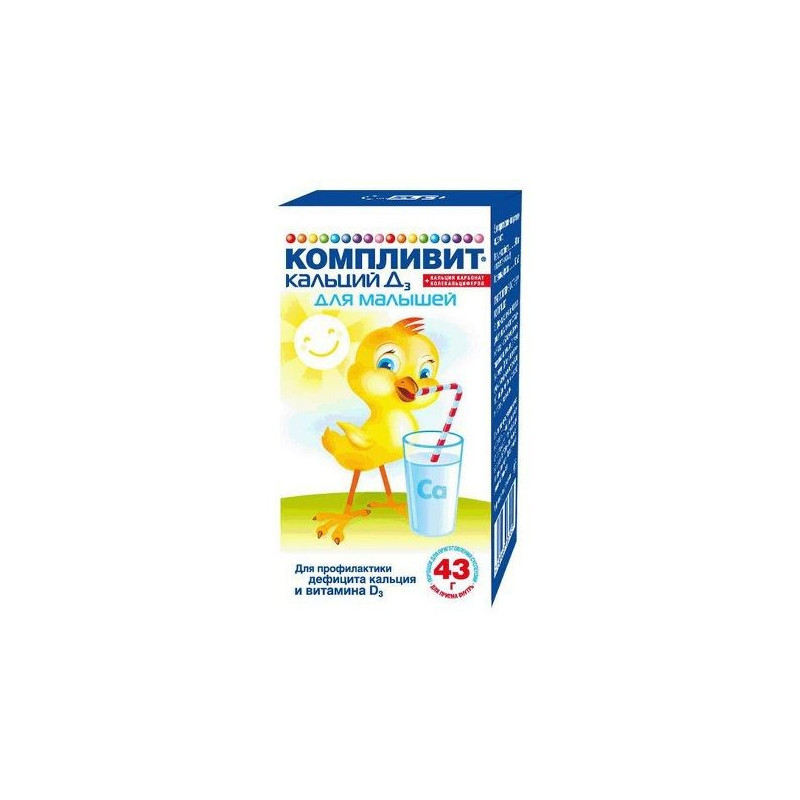



 All payments are encrypted via SSL
All payments are encrypted via SSL
 Full Refund if you haven't received your order
Full Refund if you haven't received your order
Combined medication designed to compensate for the deficiency of Calcium and vitamin D3 in the body.
Calcium is involved in the formation of bone tissue, increases its density, is involved in the mineralization of teeth, in the regulation of nerve conduction and muscle contractions, in maintaining the stability of cardiac activity, in the process of blood coagulation.
Vitamin D3 (colecalciferol) regulates the exchange of calcium and phosphorus in the body, increases calcium absorption in the intestine, promotes bone mineralization, the formation of bone skeleton and teeth in children.
The drug reduces the production of parathyroid hormone, which is a stimulator of increased bone resorption.
Prevention of calcium deficiency and vitamin D3 in young children.
Hypersensitivity, hypercalcemia, hypercalciuria, calcium nephrourolithiasis, hypervitaminosis D, decalcification tumors (myeloma, bone metastases, sarcoidosis), osteoporosis caused by immobilization, an active form of pulmonary tuberculosis; deficiency of sucrase / isomaltase, fructose intolerance, glucose-galactose malabsorption.
Carefully
Renal failure, benign granulomatosis, intake of cardiac glycosides and thiazide diuretics.
The drug is taken orally during meals. Dosage form specifically designed for young children up to 3 years.
Powder suspension preparation: In a bottle containing powder, add boiled and cooled water to
2/3 of the volume of the vial, mix thoroughly (within 1-2 minutes). Add boiled and cooled water to a volume of 100 ml (up to the neck of the bottle) and re-mix. Before each use shake the contents of the bottle.
In 5 ml of the resulting suspension contains calcium carbonate in terms of elemental calcium - 200 mg, colecalciferol - 50 IU.
Children over the age of 1 year - 5-10 ml 1 time per day; children under 1 year old - 5 ml of suspension 1 time per day, on the recommendation of a doctor. The purpose of the drug to other age groups is carried out, if necessary, in appropriate doses on the recommendation of a physician.
The duration of the course of prophylaxis is 1 month, the longer course is prescribed by a doctor.
Allergic reactions. When using the drug in the recommended doses of other side effects have been identified. If you exceed the recommended doses or at the same time take other drugs containing calcium, you may develop hypercalcemia and hypercalciuria (an increase in calcium in the blood and urine).
Possible side effects of vitamin D3 also include: loss of appetite, polyuria, constipation, headache, myalgia, arthralgia, increased blood pressure, arrhythmias, impaired renal function, exacerbation of the tuberculous process in the lungs.
Possible side effects of calcium carbonate also include: gastralgia, constipation or diarrhea, flatulence, nausea, secondary enhancement of gastric secretion.
Symptoms: thirst, polyuria, loss of appetite, nausea, vomiting, constipation, dizziness, weakness, headache, fainting, coma; with prolonged use of calcification of blood vessels and tissues. Laboratory indicators for overdose: hypercalciuria, hypercalcemia. Treatment: discontinuation of treatment, access to a doctor, diet with restriction
calcium, rehydration, diuretics, glucocorticosteroids, in severe cases - hemodialysis.
Calcium and vitamin D3 drugs reduce the absorption of bisphosphonates, Digoxin, iron preparations and Tetracycline antibiotics (an interval of at least 2-3 hours is necessary between taking the drugs).
Perhaps enhancing the action of cardiac glycosides (while taking the necessary control of the ECG and the patient's condition).
Phenytoin, barbiturates, primidon reduce the effect of vitamin D3 by increasing its metabolism.
Vitamin A, tocopherol, Ascorbic acid, pantothenic acid, thiamine, riboflavin weaken the toxic effect of vitamin D3.
Glucocorticosteroids reduce the absorption of calcium ions in the intestine.
Kolestiramin, Kolestipol and mineral oils reduce the absorption of vitamin D3 and require an increase in its dosage.
Thiazide diuretics increase the risk of hypercalcemia.
Vitamin D increases the absorption of phosphorus-containing drugs and the risk of hyperphosphatemia. With simultaneous use of sodium fluoride, the interval between intake should be at least 2 hours; with oral forms of tetracyclines - at least 3 hours.
Long-term therapy with vitamin D3 against the background of the simultaneous use of Al3 + and Mg2 + -containing antacids increases their concentration in the blood and the risk of intoxication (especially in the presence of CRF).
Simultaneous use with other analogues of vitamin D and calcium supplements increases the risk of developing hypervitaminosis D.
special instructions
In order to avoid overdosing, do not use simultaneously with vitamin complexes containing calcium and vitamin D3.
With the prophylactic use of vitamin D3 it is necessary to keep in mind the possibility of overdose, especially in children (do not prescribe more than 10-15 mg per year). Prolonged use in high doses leads to chronic hypervitaminosis D3. With long-term treatment, it is necessary to control the concentration of Ca2 + in the blood and urine (especially when combined with thiazide diuretics).
It should be borne in mind that sensitivity to vitamin D in different patients is individual and in some patients even therapeutic doses may cause hypervitaminosis.
The sensitivity of newborns to vitamin D may be different, some of them may be sensitive even to very low doses, so prevention should be carried out under the supervision of a physician.
Breast-fed newborns, especially those born to dark-skinned mothers and / or who have received insufficient insolation, are at high risk of vitamin D deficiency.
Form release powder for suspension for oral administration 200 mg + 50 IU / 5 ml.
On 43,0 g in bottles on 100 ml from dark (amber) glass. One bottle together with the instruction for application and a measured spoon is placed in a pack from a cardboard.
To store in the place protected from light, at a temperature not above 25 ° C.
To store the prepared suspension in the place protected from light, at a temperature not higher than 15 &№186;С (in the refrigerator). Do not freeze.
Keep out of the reach of children.
